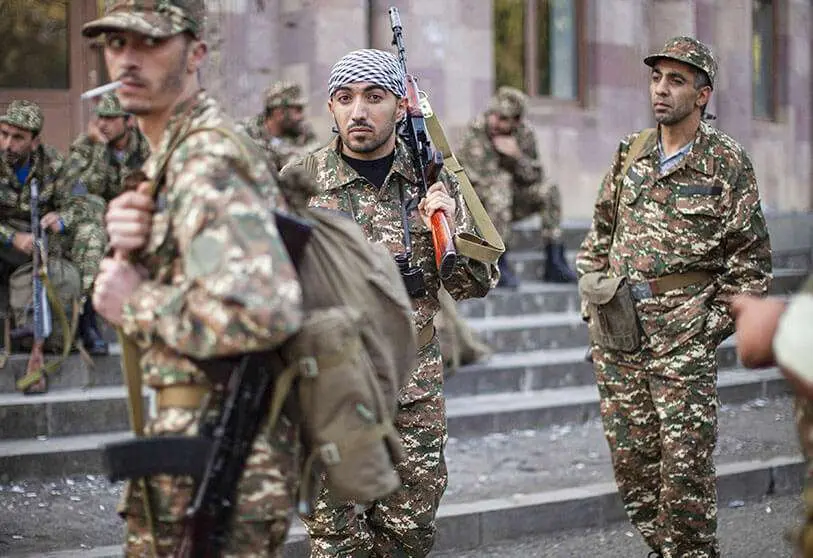Putin asks Erdogan to push for a de-escalation in Nagorno-Karabakh

The Caucasian regional conflict is arousing interest around the world. Nagorno-Karabakh was unknown to many a month ago, but the conflict we know today has been going on for a century. Turkey's intervention in support of the Azeris has prompted the Russian president to ask for its help in halting the escalation of the war.
Armenia and Azerbaijan are fighting over several territorial enclaves that have not been officially defined. Specifically, the Nagorno-Karabakh region, which became independent as the Republic of Artsaj in 1991. After a 26-year wait for an international peaceful resolution, the opposing parties have taken up arms again to settle the dispute on their own.
Yesterday, Russian President Vladimir Putin asked his Turkish counterpart, Recep Tayyip Erdogan, in a telephone conversation, to help reduce tension in the Nagorno-Karabakh region, which has been under the sovereignty of Armenia and Azerbaijan for decades.
Russia expressed the hope that Turkey would contribute in a constructive manner to the de-escalation of the conflict, considering Turkey's membership in the OSCE, the Kremlin expressed in a press release.
The Minsk Group was set up in 1992 to find a solution to this territorial dispute. The co-chairmen of the Minsk Group are Russia, France and the United States. In addition, the group consists of Belarus, Germany, Italy, Sweden, Finland and Turkey, as well as Azerbaijan and Armenia.
But this group has not yet made any progress and receives very harsh criticism by its own members of the management of this territorial conflict, which has been largely forgotten.
Turkey itself has openly criticised the inefficiency of this body which, it considers, by being led by Russia, "has paralysed the conflict rather than solved it", Erdogan denounced a fortnight ago in the Turkish media.
Turkey's intervention directly into the conflict by supporting the Azeris is making headlines. Both Turkish militias from Northern Libya and Syria and the use of Turkish military weapons are making the international community uncomfortable. The Russian leader has shown concern about the participation of "Middle East fighters in the military actions taking place in the region", according to information from the Sputnik news agency.
In this respect, he stressed the need for joint efforts to "put an end to the bloodshed and ensure a peaceful solution to the problem". Mr Putin and Mr Erdogan reaffirmed the importance of complying with the humanitarian truce agreed on October 10 in Moscow and called for a political process to be launched.

After two weeks of intense fighting, the international community was relieved on Saturday to see the announcement of a humanitarian ceasefire in Nagorno-Karabakh. This decision, sponsored by the International Committee of the Red Cross (ICRC), was intended to enable the civilian population to leave, to be provided with basic resources and to be able to visit their families and the dead. In addition, the truce provided for the exchange of war prisoners, detainees and dead bodies between the two warring sides.
However, hours after the ceasefire, gunshots and cannon fire began to be heard again. Press releases reported injuries, deaths and displacement. This was the opposite of what the international community expected from the ceasefire.
According to figures, the fighting over the last two weeks has killed at least 438 members of the Nagorno-Karabakh defence forces and 41 Azeri civilians, the respective authorities reported on Sunday. The Karabakh Ministry of Defence has added another 25 soldiers to its death toll in recent hours, bringing to 438 the number of deaths its forces have suffered in two weeks of fighting.
On the Azerbaijani side, which has not given official figures for military casualties for days, the escalation of fighting has left at least 41 civilians dead and 200 wounded, according to the Azerbaijani Prosecutor General's Office quoted by the Russian agency Sputnik. The attacks have also caused damage to 1,165 private homes, 57 residential buildings and 146 civilian facilities.
The war has continued as Azerbaijan and Armenia have accused each other of violating the ceasefire. "On the morning of October 12, the Armenian Armed Forces bombed the region of Agdam", stated a communiqué from the Azerbaijani Ministry of Defence. According to the Azeri side, the Armenian troops attempted to regain positions south of Nagorno-Karabakh, but were repelled.
The ceasefire provided for an exchange of prisoners of war and the removal of the bodies of victims of the conflict with the help of the ICRC, but these two processes have not been carried out.
Azerbaijan maintains that the solution to the conflict with Armenia necessarily involves the liberation of the occupied territories, a demand that has been backed by several UN Security Council resolutions. Armenia, however, supports the right to self-determination of Nagorno-Karabakh and advocates the participation of the representatives of the separatist territory in the negotiations on the settlement of the conflict.








